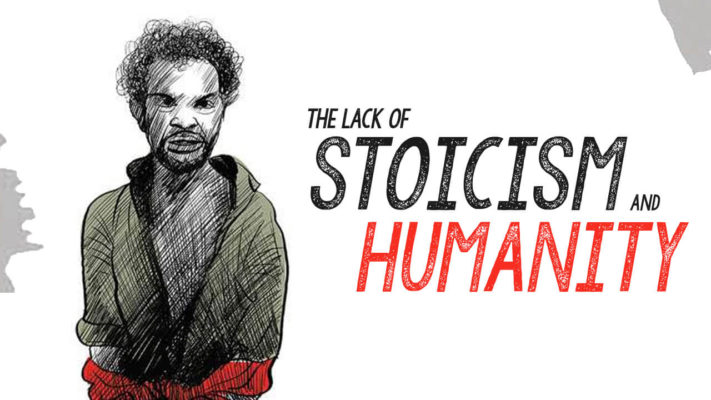
The Violence Of Our Times: A Human Takes A Life And Revels In It
On February 22nd, 2018, the humans of planet Earth, experienced something startling and truly disturbing. An incident which left us shook to the core, not just because of the sinful violence involved in the incident, but the shaky moral ground upon which the incident was carried out on. Stoicism was entirely lost.
In a remote tribal village of Attapadi, Kerala, a 27-year-old tribal man, Madhu, was tied by his own shirt and lynched by a group of arguably 16 people. He was beaten with such baffling severity that even though the police tried to save him, he vomited blood on his way to medical help and lost his life. To add to the incident, members of the mob, filmed the whole violence, clearly being immensely proud of their accomplishment, and posted it on social media. Retribution of some sort, it seemed. The crime that Madhu committed was as trivial as stealing a few morsels of food from the nearby village. The mob of 16 then took the matters of justice into their own hands, and roughed him up, and eventually beat him to death. The tragic incident took a more morose turn when Madhu’s mother confirmed to the press that her son was suffering from mental illness and didn’t intend to hurt anyone.
“It was the local people who killed him. I came to know of the incident on Thursday evening. I wanted to go there but my limbs had gone numb out of shock. Why did they kill my poor boy?” She said he had been living in a cave in the nearby forest and came down only when he ran out of food.
The State Human Rights Commission suo motu initiated a case over the incident and instructed the District Collector and police chief of Palakkad to submit a report within two weeks. Terming the incident as unprecedented in the State’s history, the BJP alleged that it proved that Kerala had become a State where peaceful life was impossible under the Leftists’ rule. The political ideas came to seep into a matter which was supposed to be dealt at a much bigger scale. Human scale. Humanity, a large chunk of its soul, was lost that day, in the dewy forests of Kerala, the God’s Own Country.
The Seduction Of Dominance And Crime
In his early works, under the Roman Empire in 165 AD, noted philosopher and one of its finest Emperors, Marcus Aurelius, touches upon the seductive powers of violence and vengeance. He says,
Battle is oft fought as a triumph over the battered soul, where as it should be fought for greater social achievement…. War thereby becomes a means to a political achievement…. However, so frail is human heart, which fails to understand the meaning of it, and sticks to it as an act of balancing and dominance. …Thus, humanity fails when it goes to war basing on the seduction of misplaced heroism.
The takeaway focus words in the above excerpt come at the end. Misplaced Heroism. We live in times when Violence is attached and almost always reflective of Heroism. ‘I’ll beat the shit out of you’ sounds incredibly cool, when you compare it to ‘I’m telling you I’ll win’. Sounding cruel, and barbaric, seems to be the norm of the day.
It was just the other day when I was walking in a mall, that I observed a mother trying to drag away her son from a toy store. This is what she says to have him categorically shut up – “I’ll kill you, bastard, I’ll smash your head and throw you out, stop crying and making a scene”. Now, the kid obviously seemed quite used to hearing such language and remained determined in his wailing stance. Then the mother, now deprived of her empty threats, smacks him on his forehead, and plucks him up off the ground, and carried him away. The kid was perhaps 5 years old. Not more than that. The wondrous thing in the whole incident was, like me, there were easily about twenty people who watched the incident, but remained utterly unperturbed. A mother smacking her kid, of course, what’s wrong with it? That seemed to be the thought running through their mind. Worse even, I could tell from a half of those people had this rather ominous thought crossed in their mind – Hit him harder so that he’ll shut up and let us shop us in peace.! Or I would’ve done the same if my kid was wailing like that, so I guess it’s cool.

We Are Violent By Nature? Or Is It Just Our Excuse?
Now you tell me, in this little social incident, which happened not in any tribal village, but right in the middle of a shopping mall, haven’t we shown ourselves? If you think this example, isn’t a true representation of what we as a society have turned to, and how we place the importance of violence as a universal solution to everything we can’t solve, then allow me to give you another situation.
Imagine –
You and your friend, finally get a couple of good seats for a great movie. You book your tickets from online, pay the GST as well, arrive at the theatres an hour early, take immense care to catch the movie from the first frame of the first advertisement as well. But here goes the game. As soon as the movie starts, and has picked up the pace, somewhere in darkness and a couple of rows in front of you, a baby starts crying. The parent immediately tries to calm the baby down, but as is the case, the baby’s crying turns to high pitched wailing. It becomes deafening enough to tone down the movie’s dialogues. Then you feel a certain level of irritation. Which soon becomes a frustration, leading to palpable anger. And mind you, it’s not just you who has been disturbed. There rows of fine ladies and gentlemen, who can’t take it anymore. One of them, then as a trigger point, shouts at the parent. This triggers a domino effect for everyone around, including you. You burst out, a sleuth of cusses at the parent, and shout at him to take the baby if he isn’t already doing that. In that moment, the amount of 500 bucks that you spent for the movie, is more important, than the baby itself.
Violence, therefore, is used to condemn something or prove a point, precisely and urgently. We are not patient. No one is. Violence is everywhere. These words, Traffic Jam, BreakUp, Arguments, Poverty, Religion, etc for most people act as the trigger words to catapult themselves into Violent actions. And be heroic about it. They do not have the intellect, temperance or patience to put across their point in a stoic manner. That’s where we need to take a glimpse at the definition of Stoicism, an age-old philosophy which combines a human’s philosophical mindset with that of effective societal change.
Stoicism And Avoiding The Mob Mentality
Traditionally, Stoicism as a school of thought originated from the acclaimed Greek philosopher, Zeno, who lived in the decades of 90AD onwards in Cyprus. According to his thought, Stoicism is a ‘manner of unaffected living’. Virtue, Tolerance and Self Control became important elements of this philosophical tool. Zeno then went onto categorize his thought process, Stoicism into four cardinal virtues – Practical Wisdom, Unshakable Temperance, Empathetic Justice, and Integral Courage. These four, Stoicism believes, makes for a detached, yet totally humanitarian approach towards life, and its multitude of problems. Now, when we look closely, these four cardinal virtues of Stoicism reflect a plain simple logic of living. Let’s analyze with the Mob Lynching incident, and see where humanity today may be taking a step in the wrong direction.
Practical Wisdom – You Made It, Therefore You Can Make It Again
This aspect talks about the way we deal with life’s complex problems. Most of our grievances in life, begin to resurface from the depths of our soul when we are in danger or are otherwise losing out on the plan of actions we had. The slightest hint of failure, or loss of control, makes us do something entirely stupid or uncalled for. Here, Stoicism implies a simple rule of identifying problems, one which is implied in the Buddhist way of life. The Rule is simple – Look at what you are losing by the said defeat or loss of control and define it on the basis of recoupment. If you can have plenty of opportunities to reclaim or recoup, be stoic in the face of defeat.
Philosophers overages have maintained that there are only 2% of incidents in our lives, which can truly leave unsurmountable loss in our lives. Usually, this is associated with death. Everything else can be formed, earned, created, claimed or generated back. If so be the case, Stoicism asks humanity to not fret. If the Mob would’ve understood that it was after all Rice, that Madhu, the victim, was stealing, even for one moment, maybe the incident wouldn’t have occurred at all. Keenly observe, and maybe it’s not about the rice. It was the ego and respect that they felt was snatched away. And that made them furious enough to kill the tribal man. Hence, the mob had no confidence that their respect could be reclaimed. Clearly, Practical Wisdom was missing.

Unshakable Temperance – It’s Not About Tolerance But Acceptance
Tolerance, as we most commonly use in the context of Religious Tolerance, undermines the fundamental value for it. We are not ‘tolerating’ each other. There’s no purpose in that. Acceptance, however, is the unifying form of a plurality of different faiths, castes, creeds, belongings, orientations and more. Marcus Aurelius, the Roman great stresses upon the concept of Temperance by asking a simple question – Who are you? – Are you what the society wants you to be, a reflection of communal thought or are you someone true to your heart?
Inherent goodness in our heart is almost always clouded by the idiotic sense of judgement, which is rooted in a communal understanding of a situation. The problem, therefore is, the community does not understand a situation clearly. Look at history, and you shall see that humans have a horrible track record of following ideals and men, who have led them to their doom. Why? Why do we always follow the wrong idea? Or could it be said that we follow an idea and make it prosper into something unexpectedly wrong? These questions could only be answered by Temperance. Usually, Temperance is defined as abstinence from a lure. But Stoicism defines it as detachment from the communal definition. You are not a Hindu, Muslim, Sikh, Jew, Christian or Buddhist. You are you. You are not rich, poor, heroic or victim. You are you. You are not successful, failure, capitalistic or confederate. You are you. And you are yourself as defined by your soul and thought. When we see, the Mob Lynching incident, it seems to be a case of reflective behaviour. One amongst the mob wants to beat Madhu to a pulp, a heroism prevails, and therefore, this prompts others to do the same, despite any conflict in their heart. Then comes the issue of one-upping the incident. Hence, one of them decides to shoot their heroism. Keenly observe, it is not a video. It is a selfie video. The person shooting it, wants people to see his heroism. A sense of communal validation is perhaps what he is seeking, in an utter failure towards Temperance and humanity.

Empathetic Justice – What If It Were You?
The philosophy of Stoicism also asks its thought followers to understand the fairness of justice and its deliverance. It begs a question – Would you want to go through the same punishment for a similar crime? If you are delivering a judgment and sentence, would you being a victim, accept it in all fairness. Zeno of Cyprus, talking about the parliamentarian aspects of Stoicism appeals to the leaders that, if they are to pass a judgement, the first and foremost aspect that they need to understand is, Empathy. The powerful are not people who can swing the sword but are those who know the taste of death and never savour it. A ruler or a government has to always balance the crime and the justice. That is specifically why we have elected officials, crafted and specialized judiciary who are learned, in the art of Empathy. Yes, sometimes the crime far exceeds the punishment, but to take into consideration all the circumstances surrounding the crime is far more important. Here is where the common knowledge cannot be trusted. People are emotional beings. They do not adhere to laws and regulations, which are constructed on a solid base of logic, temperance, and empathetic justice. Simply, people do not care.
Madhu perhaps was hoping for that. Any sane man would’ve run away, tried to hit back or resort to some fight, to prove his point. But not Madhu. Madhu trusted the judgement of saner people, better people. He perhaps saw his limitation of psychological stability as a reason enough to trust the society to take a better decision. And the decision that the Mob passed ironically was miles away from sanity. They beat him to death. He was wrong in placing his trust in the society to take the right call. A community of differentiating and varying intellect is often incapable of Empathetic Justice. That being said, Individuals are. Hence, the murderous event took place, right at the moment that the Mob formed, without a clear set of rules and purpose.

Internal Courage – Strength In The Smallest Of Things
Zeno of Cyprus defines the last cardinal rule of harmonious and stoic society, as the courage to do small things. Through Stoicism, he says, when people start to brave their circumstances, ones which are mundane, meagre and minute, the need to be heroic under extraordinary circumstances, gives them a sense of direction. What does this mean? To explain it plainly, we have no idea what to do when our veins are filled with energy pumping adrenaline. Most people fail to see sense when adrenaline takes over. And most of them spent this exciting energy on doing something terrible. They seek to utilize this energy to show the world that they are not afraid of anything, and suddenly feel like there does not exist any form of repercussions to their actions. Out of spite, out of an emotional drive, out of spontaneous intent, and more, the sudden rush of things have many names. Stoicism speaks that, this is because our bodies and minds have no idea how to deal with this sudden unrecognizable power. When do we start to recognize, direct and tap into this energy when we want. When do we ‘control aggression’? Its pure logic to say that, when we know about it. When we have seen it on a regular basis.
Stoicism, therefore, speaks of a people, who brave themselves to do something new, extraordinary, adventurous, and out of their comfort zone, regularly. These people, know the rush of blood in trying out new things and are more aware of their composition. Now on the other side of the spectrum, what if you are stuck with regularity and have no idea what to do when aggression takes you over. Simple. You heed the violence in it. Stoicism vehemently prohibits it. Have the internal courage to do the smallest of things, changes of the norm, and you shall know how to control and effectively use your aggression and courage when it is most required.

Mob Lynching Is Society At Its Weakest
In the case of Mob Lynching and Madhu it can be fairly said that the Mob got swayed into action, but once the wheels were turning, they had no idea to stop themselves. This point to some would look like there is a justification for what happened. Absolutely not. This is the pathetic play of nature that made foolish men represent the weakness of a society in protecting one of its own. The whole passage is a representation that society is flawed, and time and again, due to lack of Stoicism and its thought imbibing nature, Mob’s will be created. Innocent and ‘saner’ Madhus will be pelted and killed. Basing on the very fact of inherent flaws, is there something we can do? There is only one way, Stoicism that a harmonious existence can be achieved. The philosophy says, follow the virtues as defined by the internal moral compass, and not by the society definition. Be fiercely individualistic in your actions towards others around you. Perhaps that is what makes great people, great. Perhaps, that is what true heroism, in the definition of Stoicism, stands for.














